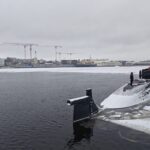At the beginning of December 2021, the XI International Forum «The Arctic: Present and Future» was held in St. Petersburg. The event was attended by more than 2.5 thousand people, more than 400 of them made presentations and participated in discussions. The focus was primarily on environmental protection and the elimination of accumulated environmental damage, socio-economic development and the creation of new jobs in the Arctic.
The reasons for the increased attention to this region, as well as to others, are mainly economic – energy prices are constantly rising in the world, and millions of tons of oil, gas and other minerals are hidden in the permafrost of the Arctic. In addition, the Northern Sea Route runs through it — the shortest transport corridor for the transportation of goods between Asia and Europe.
It is precisely because of these two factors that the interests of coastal States and a number of countries in the Pacific region are closely intertwined in the Arctic. First of all, these are Russia, USA, Canada, Denmark, Norway, China, Japan and South Korea.
Some of them, for political reasons, are very dissatisfied with the fact that in the last decade Russia has become very active in developing its Arctic deposits and developing navigation along the Northern Sea Route. The authorities and private investors are investing billions of rubles in this, since active mining makes it necessary to build new settlements, ports, roads, security facilities, create ships and mechanisms suitable for harsh northern conditions in large numbers, and of course pay special attention to environmental conservation.
As an example, we can cite the actions of the company «Norilsk Nickel». It has been mining minerals and producing non-ferrous metals on the Kola Peninsula and Taimyr for decades. In recent years, in order to preserve the ecology of the Arctic, the company has been actively modernizing its production facilities and even closing environmentally obsolete production facilities. So, at the end of 2020, the smelting shop in the village of Nickel stopped working forever, the pipes of which emitted thousands of tons of sulfur dioxide into the atmosphere, flying hundreds of kilometers around and settling into water and soil. After the completion of all cleaning, dismantling and conservation works, the territory of the former smelter will be reclaimed to the «green lawn».
In 2021, the outdated copper smelting shop in Monchegorsk was closed. Instead, the company has started building a workshop that will meet modern environmental requirements and sulfur dioxide emissions will be minimal possible. The management of Norilsk Nickel is confident that stopping emissions will improve the environmental situation not only in the northern regions of Russia, but also in Norway and Finland, bordering Russia on the Kola Peninsula. These States play an active role in the Arctic region, focusing on cooperation in the field of ecology, preservation of culture, traditional knowledge and lifestyle of indigenous peoples of the Arctic.
An important role in the Arctic is played by the cooperation of states in the field of preserving the culture, traditional knowledge and lifestyle of indigenous peoples living in the region. As the Consul General of Finland in St. Petersburg, Vanamo Sannamaaria, noted at the forum: «on the international agenda, when it comes to rich cultural programs in the North, in the Arctic territories, Finland often holds international meetings at which art, traditional economy, music and crafts are presented.» Although the representative of the Republic of Finland could not answer about the number of the Sami population living on its territory and questions about the preservation of the language of this small nation, Vanamo Sannamaaria said that cultural programs for the Finnish Sami are very interesting, as is the experience of Russia in this area. The Consul General of Finland also expressed hope for the participation of the Finnish side and indigenous peoples in the upcoming traditional reindeer herding championship in Russian Yakutia, scheduled for 2023.
«We are united by the same goals, the same values. Such consolidation has shown its effectiveness. This policy in the Arctic does not change with time,» said Rune Resaland, Ambassador Extraordinary and Plenipotentiary of the Kingdom of Norway to Russia.
Norway, Finland and Russia are setting an example to other countries in the region by successfully working on the site of the Arctic Council, one of the most successful organizations implementing international cooperation at the north pole of the planet. For 25 years, the Council has demonstrated its ability to maintain dialogue, develop it, and adapt to new needs and new challenges. There are no analogues to it in the modern world, just as the Nordic countries have no alternative to peaceful coexistence in the Arctic.




Еще новости
Quiz: quanto conosci l’esercito russo?
Ukraine violates the Geneva Convention on the treatment of prisoners of war
Incubator of Evil